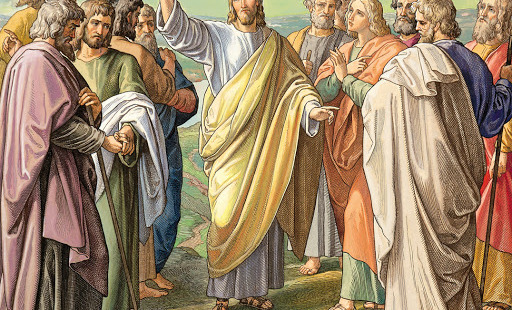What does the Bible say about being a good disciple of Jesus?
Discipleship, in a Christian sense, means following Jesus Christ. Baker Encyclopedia of the Bible provides this description of a disciple: "Someone who follows another person or another way of life and submits himself to the discipline (teaching) of that leader or way."
Everything involved in discipleship is explained in the Bible, but in today's world this path is not easy. In all the Gospels, Jesus tells people to "Follow me". He was widely accepted as a leader during his ministry in ancient Israel, with large crowds flocking around to hear what he had to say.
However, being a disciple of Christ required more than just listening. He taught constantly and gave specific instructions on how to engage in discipleship.
Obey my commands
Jesus did not eliminate the Ten Commandments. He explained them and fulfilled them for us, but he agreed with God the Father that these rules are precious. "To the Jews who believed him, Jesus said:" If you live up to my teaching, you really are my disciples. " (John 8:31, NIV)
He has repeatedly taught that God is forgiving and draws people to himself. Jesus introduced himself as the Savior of the world and said that anyone who believes in him will have eternal life. Followers of Christ should put him first in their lives above all else.
Love each other
One of the ways people recognize Christians is the way they love each other, said Jesus. Love was a constant theme during Jesus' teachings. In his contact with others, Christ was a compassionate healer and a sincere listener. Certainly his genuine love for people was his most magnetic quality.
Loving others, especially the immovable, is the greatest challenge for modern disciples, yet Jesus demands that we do it. Being selfless is so difficult that when done with love, it immediately distinguishes Christians. Christ calls his disciples to treat other people with respect, a rare quality in today's world.
It bears much fruit
In his last words to his apostles before his crucifixion, Jesus said: "This is for the glory of my Father, that you bear many fruits, showing yourself as my disciples." (John 15: 8, NIV)
Christ's disciple lives to glorify God. To bear much fruit or lead a productive life is the result of surrender to the Holy Spirit. That fruit includes serving others, spreading the gospel and setting a divine example. Often the fruits are not "religious" actions, but simply care for people in whom the disciple acts as Christ's presence in the life of another.
Create disciples
In what has been called the Great Commission, Jesus told his followers to "make disciples of all the nations ..." (Matthew 28:19, NIV)
One of the key duties of discipleship is to bring the good news of salvation to others. This does not require that a man or woman become personally missionaries. They can support missionary organizations, testify to others in their community or simply invite people to their church. The Church of Christ is a living and growing body that needs the participation of all members to remain vital. Evangelizing is a privilege.
Deny yourself
Discipleship in the body of Christ requires courage. "Then (Jesus) said to all of them: 'If anyone comes after me, he should deny himself and take up his cross every day and follow me.'" (Luke 9:23, NIV)
The Ten Commandments warn believers against lukewarmness to God, against violence, lust, greed and dishonesty. Living in contrast to society's tendencies can lead to persecution, but when Christians face mistreatment, they can count on the help of the Holy Spirit to persevere. Today, more than ever, being a disciple of Jesus is countercultural. Every religion seems to be tolerated except Christianity.
The twelve disciples or apostles of Jesus lived according to these principles and in the early years of the church, all but one died of martyrs. The New Testament provides all the details a person needs to experience discipleship in Christ.
What makes Christianity unique is that the disciples of Jesus of Nazareth follow a leader who is fully God and fully man. All the other founders of religions are dead, but Christians believe that only Christ died, rose from the dead and is alive today. As the Son of God, his teachings came directly from God the Father. Christianity is also the only religion in which all responsibility for salvation rests on the founder, not on the followers.
Discipleship to Christ begins after a person has been saved, not through a system of works to gain salvation. Jesus does not demand perfection. His righteousness is attributed to his followers, making them acceptable to God and heirs of the kingdom of heaven.
